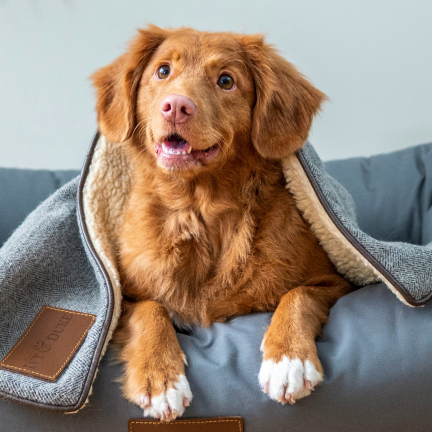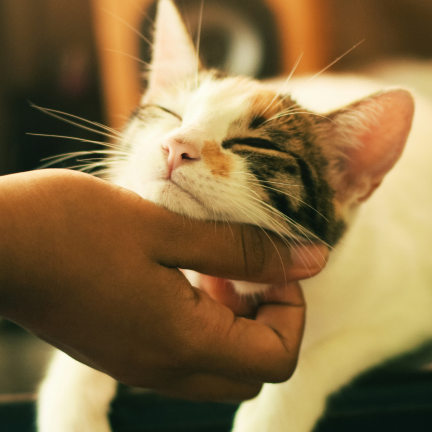Blog:Pets and Holiday Hazards

As the holidays approach, most pet owners are too busy worrying about pumpkin pie, stuffing, and how to keep Aunt Edna away from the eggnog to think much about how the festivities will affect their pets. However, the holidays are a very busy time for veterinarians because they can pose some pretty serious health risks to animals. Nobody wants to spend a holiday at the vet’s office, so here are a few common hazards to avoid.
PLANTS
Everyone has heard that poinsettias are highly toxic to dogs and cats. In reality, the true poinsettia plant (Euphorbia pulcherrima) is a mild gastrointestinal irritant that rarely causes major illness. Holly and mistletoe also have a bad reputation, but although mistletoe can cause heart problems if ingested in large amounts, these plants generally just cause GI upset.
The major plant of concern is the lily. True lilies (Lilium and Hemerocallis species) are extremely toxic and even a small taste of any part of the plant can cause fatal kidney failure in cats. While lilies have not been reported to cause kidney damage in dogs, they do cause vomiting and diarrhea if ingested.
Quick tip: Many “lilies” such as calla and peace lilies are not true lilies and do not have the same potential to cause renal failure, but they can lead to oral and GI irritation if ingested.
Remember that the above information is just a guideline. If your pet has eaten a plant and you are not sure whether it is toxic, it’s always safer to call your vet for advice.
DECORATIONS
Christmas trees and other decorations are more than just a fun new place for Fido to lift his leg. Decorations such as glass ornaments can cause serious oral and gastrointestinal damage if chewed and/or swallowed. Tinsel looks pretty on the tree and might make Fido’s poop easier to find with a flashlight, but if it doesn’t pass through his system it can cause major damage to his intestines. Linear foreign body obstructions from tinsel or ribbon can be difficult to diagnose since they aren’t always obvious on routine x-rays. By the time the problem is discovered, there is often significant GI damage
Quick tip: if you see any kind of string or ribbon poking out of your pet’s rear end, DO NOT PULL ON IT. The string may be longer than you think, and yanking on it could cut into your pet’s intestines and make matters worse. Let your vet decide how the object should be removed.
In addition to ornaments, beware of exposed electrical cords –cats and dogs think these are fabulous chew toys and could suffer a potentially fatal electrical shock if they bite through the cord. Even if you don’t think electrical cords would interest your pet, it’s safer to keep them hidden and out of reach.
TABLE SCRAPS
People food is the number one reason for post-holiday vet visits. We’ve all been there: you’re enjoying a succulent turkey with creamy mashed potatoes and Grandma’s famous gravy. It tastes so good, and it must smell like heaven to Scrappy, and she’s giving you her most heart-melting gaze… what’s the harm in letting her have a few bites? You’ll find out a few hours later when her intestines liquefy and you’re roused from your tryptophan-induced coma to clean up the horrific results.
Sometimes those results are more than just a little vomiting and diarrhea. Fatty foods can cause pancreatitis (inflammation of the pancreas) or hemorrhagic gastroenteritis (which is exactly what it sounds like; vomiting and bloody diarrhea). These can require expensive diagnostics, hospitalization and can even be fatal if serious enough.
Scrappy will probably give you her biggest brown-eyed stare during dessert too, but don’t take the bait. Any sweet or fatty treat could cause stomach upset, but the most notorious culprit is chocolate. The amount of chocolate required to cause toxicity has a lot to do with the type of chocolate and the size of the pet. For example, unsweetened baking chocolate is more than five times as toxic as milk chocolate, but only a few ounces of milk chocolate could kill a small dog.
Enjoying a postprandial cup of coffee? Don’t leave it unattended. Coffee is toxic for the same reason as chocolate. Unfortunately, many dogs love coffee and will happily drink your espresso if you leave it within reach. If you think your pet has ingested chocolate or coffee, call your vet right away.
Quick tip: We suggest you avoid the temptation to share food with your pets, but if you desperately want to give Scrappy something from the table, stick with raw carrots. They won’t cause GI problems, and most dogs love them.
ANTIFREEZE
As the holidays approach, the weather gets colder… it’s a frigid 72 degrees outside! OK, so in southern California we don’t really have to worry about our engines freezing up, but ethylene glycol antifreeze is so dangerous that it warrants a mention, especially since many of us travel to the mountains during winter. Ethylene glycol is extremely toxic to the kidneys and ingestion can be fatal without aggressive treatment. It also tastes sweet, which makes it appealing to animals. If you use antifreeze, make sure it hasn’t leaked or spilled anywhere where your pet might find it.
If you’re planning a holiday getaway to the snow, remember that many people use antifreeze in their plumbing to keep it from freezing up. Dogs think toilet water is delicious, so make sure you flush the toilets free of any residual antifreeze before you let Fido anywhere near the bathroom.
If you even suspect that your pet may have ingested antifreeze, call your vet immediately.
Quick tip: Propylene glycol is a safer alternative to ethylene glycol and is available at most automotive supply stores.
This is supposed to be a joyous and festive season, but every year thousands of pets get injured or sick because of holiday hazards. Hopefully with these tips, you won’t end up spending Christmas Eve at the emergency vet. And that’s a good thing, because the stuffing is ready. And Aunt Edna found the eggnog.



